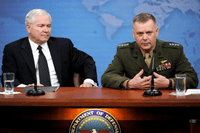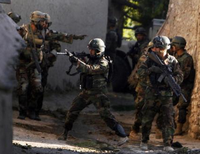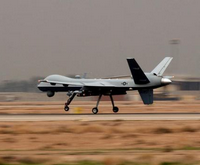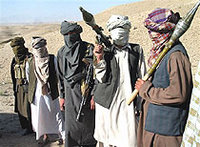When it comes to the stakes involved in today’s Iraq “withdrawal,” so far discussion has focused on the implications for the U.S. project in Iraq. But the outcome, as reflected in the security situation over the next six months, will have regional repercussions as well, because we’re currently applying variations of the same nation-building model we’ve used in Iraq around the Middle East and South Asia. The most obvious example is Afghanistan, and there’s overlap with what we’re pressuring Pakistan to do in the FATA. But there’s also the U.S. involvement in training Palestinian security forces in the West Bank. […]
Afghanistan Archive
Free Newsletter
As much as NATO coalition partners’ contribution to the Afghanistan War has been criticized over the years, it bears noting that as long as the war is a multilateral effort, Russia can’t hold negotiations over supply routes entirely hostage to its bilateral spats with the U.S. That said, the fact that the tone out of Moscow regarding supply routes in general has been pretty conciliatory of late suggests to me that Russia was authentically on board with the Kyrgyz government’s decision to renew the Manas lease. That reflects the fact that the last thorny irritant left over from the Bush […]

Back before the Iraq surge, “military operations other than war” — a now-antiquated term referring to non-traditional warfare — were treated as “lesser includeds,” filed deep under subsections of big-war plans, doctrine, and acquisition strategies. Today, by contrast, the U.S. national security establishment is increasingly embracing what I like to call the “greater inclusive” paradigm, which recognizes our military’s rising quotient of such operations, not as some rare exception, but rather as the new rule. Thanks to Iraq and now Afghanistan-Pakistan, the military no longer assumes that any force constructed and trained for big wars can automatically handle the “other […]
According to Defense News, the only real change at the Manas base supplying the Afghanistan war will be in its name: instead of calling it an air base, it will now be called an transit corridor. Besides the nomenclature, though, the military activities, mainly basing tankers for refueling missions, will continue. According to RIA Novosti, Russia’s okay with the sleight of hand, with President Dmitry Medvedev calling the “transit center” a contribution to the fight against the joint terrorist threat. The fact that the lease was only extended for a year strongly suggests we haven’t heard the last of this. […]
Joshua Foust highlights the disconnect between the public COINspeak surrounding Gen. Stanley McChrystal’s appointment to run the Afghanistan war and the private KILLspeak surrounding his appointment to run the Afghanistan war: [W]hile publicly McChrystal says everything rightabout being population-centric and all that, very few, and I mean thisseriously, VERY few of the groundpounders within USFOR-A are gettingexcited about finally executing a proper counterinsurgency. Instead,all the excitement is about “finally” being able to “take the fight tothe enemy,” “now we get to kick some ass,” and similar sentiments. In other words, at least a large number of soldiers, both within andwithout […]
So in the end, Kyrgyzstan’s threat to close the Manas air base we’ve been using to supply the Afghanistan war effort was just a bargaining ploy. A successful one, at that, since it almost quadrupled the yearly lease we’re paying, while apparently rolling back the terms to now include the transit of only non-military supplies. (Question: What are we going to shoot at the bad guys in Afghanistan once we can’t ship in any ammo anymore?) Some folks might read this as a U.S. victory over Russian meddling. But the fact that the terms of the lease have now been […]
If you read only one article about the Afghanistan war each week, make it this Washington Post article. If you read dozens of articles about the Afghanistan War each week, make sure to add it to the list. It is a very, very eye-opening piece of reporting that illustrates to what degree our failure in that theater has to do as much with shockingly poor conception, management and execution as it does with the difficulty of the task. It also shows to what degree foreign policy failures are determined, often years prior, by domestic policy failures. Just like it often […]

Winning American wars these days is four parts politics and just one part fighting. Contemporary military doctrine — counterinsurgency and stability operations — tasks soldiers, on the whole, with state-building. Victory, or at least success, means building from the bottom up, rather than destroying from the top down. But because conditions on the ground are so delicate, for the one part of warfare that remains fighting, there’s no room for error. With Gen. Stanley McChrystal taking charge of U.S. and NATO troops in Afghanistan on Monday, warfighting is on everyone’s minds. McChrystal has been appointed to command the Afghanistan war […]
I’m sure I won’t be the one to convince him of why, but I disagree with Michael Cohen when he says that the “fetishization and enshrinement” of COIN is “a slippery slope for more not less US military intervention.” In the same post, Cohen rightfully reminds us that trends in military doctrine have a pretty short half-life. The U.S. didn’t go around looking for places where we could unleash an air war in the late-90s, after all, even though that trend, as Cohen insightfully points out, was all the rage after the Kosovo campaign. Surely that’s an argument against his […]

The skyrocketing use of unmanned aerial vehicles (UAVs) by U.S. forces in Iraq and Afghanistan has generated intense debate about how useful they are against insurgent/terrorist networks. Some prominent counterinsurgency experts have decried the “siege mentality” among non-combatant locals caused by collateral damage from the drone strikes. But despite the charge that drones represent a technology (i.e., a means) in search of a strategy (i.e., end goals), there’s no question that: 1) drones are here to stay, and 2) they’re truly re-symmetricizing the battlefield in a much-needed manner. Over the past generation, warfare has dramatically downshifted, from the Cold War’s […]
I don’t want to make too much of this NY Times story about al-Qaida operatives making their way from Pakistan to Yemen and Somalia. It’s based on a pretty small sample size, as well as on a “senior Obama administration official” who has every reason to attribute “some of the movement to ‘the enormous heat we’ve been putting on the leadership and themid-ranks’ with Predator strikes, launched from both Pakistan andAfghanistan.” After all, widening the drone strikes in Pakistan was one of President Barack Obama’s campaign stances, so it’s no surprise to see his administration pushing back against the growing […]
For some reason, this sentence from the CNAS report (.pdf) on Afghanistan and Pakistan that I wrote up yesterday kept rattling around the cranium: But because populations in civil wars tend to side with whichever group exercises control, protecting the population must take precedence over all other considerations. That sums up in a nutshell the central premise of COIN doctrine, from which all of its operational priorities are derived. Now, to be very clear, unlike Michael Cohen, I think that the COIN doctrine represents an enormous advance in the U.S. approach to warfare, both strategically and politically. Strategically, it represents […]
After flagging this very valuable post by Tim Lynch on conditions inthe southeast of Afghanistan, Joshua Foust observes, “[T]here is afundamental disconnect between what we are doing in Afghanistan andwhat we expect to happen.” Lynch’s post is a long but essential read,and I second Foust’s assessment. The question is, Will the added troopsand vaguely hinted-at shift in operational priorities be sufficient torecouple what we’re doing with what we expect to happen? With that question fresh in my mind, I clicked through tothe new CNAS report (.pdf) on Afghanistan and Pakistan, which offers proposalsfor metrics and operational priorities on both sides […]
I’m not the only one who sees a short expiration date on our NATO allies’ commitment to Afghanistan now that the war has been “Americanized.” Here’s Jari Lindholm: I’m no apologist for ISAF ineptitude, but let’s be honest: for eightyears, Europeans have been covering America’s ass in the north. Whathappens when they pull out is anybody’s guess. Make no mistake, though:now that they’ve been handed an excuse on a silver platter, they will leave. Lindholm leaves some room open for the French to stay, and I’d go as far as to say it’s unlikely they’ll leave. There hasn’t really been […]
Something of a blog spat has broken out between Andrew Exum and Michael Cohen, and before weighing in, I’ll endorse the suggestion made by one of Exum’s commenters that the two ought to hash this all out over some drinks. Both take an intellectually honest approach to questions of national security, and I’m sure that together they’d generate more light than heat. So take a chill, guys, COIN-bayah. As for the case on the merits, I’d say they’re both right and wrong. Cohen’s right when he says that we’re not really engaged in a counterinsurgency in Afghanistan. Exum finds this […]

ISLAMABAD — The showdown in Waziristan hinted at by Pakistan President Asif Ali Zardari 10 days ago may have already begun with the killing of Taliban militants by security forces in South Waziristan, and the deployment of hundreds of additional troops to the troubled region in the last few days. In response, Pakistan-based Taliban have launched multiple suicide and bomb attacks in two major cities and threatened to further target others. A local official in South Waziristan — who spoke on condition of anonymity, as he was not authorized to comment — told World Politics Review that security forces killed […]
